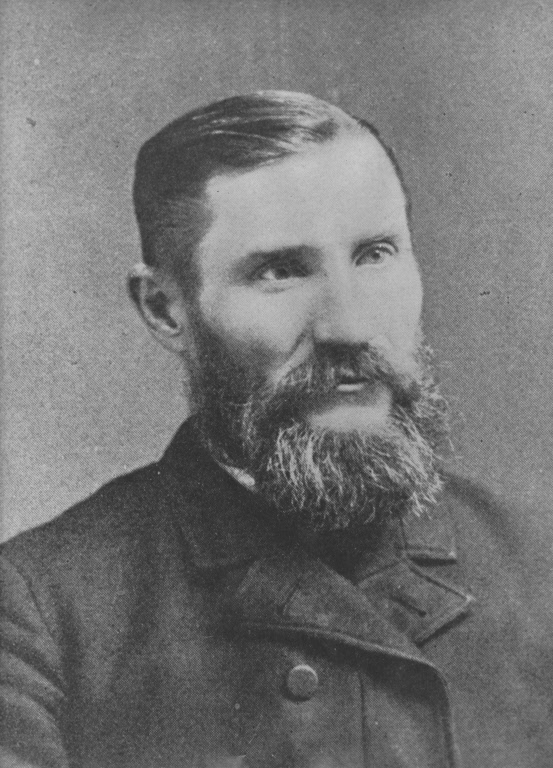
Daniel Sidney Warner was born June 25, 1842, to Pennsylvania German parents, David and Leah Warner, who were then residing in Bristol (now Marshallville), Ohio (about 15 miles southwest of the city of Akron). Historian C. E. Brown says concerning him:
“So far as I can find (and I have read all of D. S. Warner’s journals) there is but very little on record concerning his early life. His father kept a tavern in Bristol, Wayne County, Ohio, from 1836 to 1843, when he removed to a farm of 140 acres near New Washington in Crawford County. Here in a house built partly of logs, three-fourths of a mile southwest of the village, Daniel spent his childhood.”
Although D. S. Warner’s father was non-religious, his mother was a devoted Christian woman. They lived in a community of Roman Catholics and Lutherans, and he had some exposure to the adherents of more evangelistic types of churches as well. On a February night of 1865, while attending a revival meeting at a country schoolhouse in northwest Ohio, young Daniel Warner found Jesus, the Lover of his soul with whom he would later became so intimately acquainted and whole-heartedly devoted. He was so gloriously converted that February night that his friends were made to marvel at the change in his manner of life.
For about two years after this, he diligently searched for a church that fit the description of the one of which he read in the New Testament. Having a sharp and brilliant mind and a conscientious soul, and feeling a definite call to preach the Gospel, he investigated the various creeds, doctrines, and tenets of the denominations available for joining, scrutinizing their doctrines by the Word of God. At length he decided to cast his lot with a group that originated from the labors of John Winebrenner during the years 1925 – 1930, called the “Church of God.” Of all the denominations he knew of, its teachings and tenets resembled most closely what he saw taught in God’s Word, and it bore a scriptural name. He became a licensed preacher in this denomination during the first few years of his ministry.
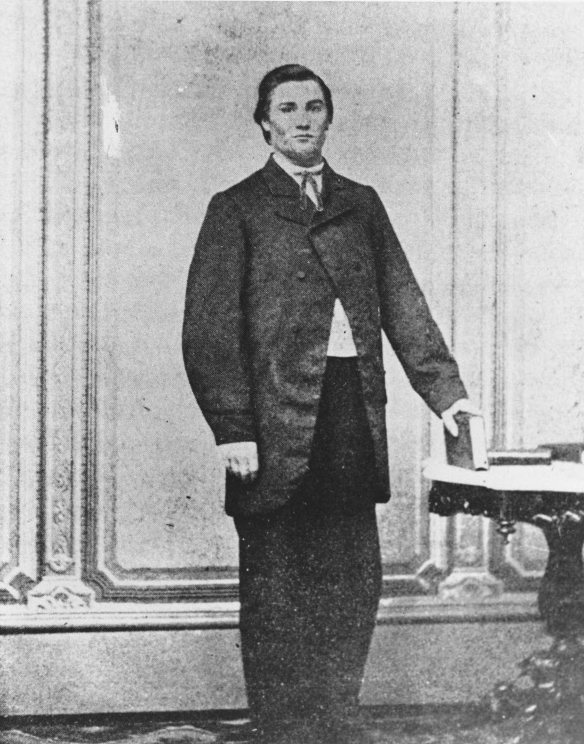
After about 10 years, however, he was expelled from that denomination for embracing and preaching the holiness doctrine of “entire sanctification” as a definite second work of grace. The leaders of the Church of God group he had joined believed this doctrine to be a “heresy.” (See my article titled “A Few Facts About Warner” for details.)
In his diary, dated August 18, 1877, he writes, “Long talk with Brother Mitchell and Sister Shriner on sanctification. Brother M. talks reasonably; Sister S is hostile to the blessed truth, but of course it is through ignorance. She thought I should leave the Church of God at once and not destroy it by my doctrine of holiness, having actual fears of holiness. Oh, I hope and pray to God to lead my dear brethren on to this heart-perfection. Would to God they understood this blessed full salvation! Nothing but wrong notions of perfect holiness or an evil spirit can oppose entire sanctification, as it does not in the least disturb or conflict with any doctrine of the church. It allows all that the Bible or any man attributes to regeneration. Instead of depreciating, it has greatly magnified justification.”
Warner’s vision of what the New Testament church is, and is not, became too spiritual for many religious church-goers to comprehend. His belief in entire sanctification compelled him to completely abandon himself to God and His perfect will, and that alone. In January of 1881 he began publishing an anti-sectarian holiness journal which he named The Gospel Trumpet. It was not until later that year, however, that he completely withdrew himself from all humanly organized religion. In the June 1, 1881, issue of The Gospel Trumpet, he wrote:
“And now we wish to announce to all that we wish to cooperate with all Christians, as such, in saving souls – but forever withdraw from all organisms that uphold and endorse sects and denominations in the body of Christ.”
He was accused by some of “leaving the Church of God.” In the February 8, 1882, issue of The Gospel Trumpet, he replied, “There is absolutely no way under heaven and among men whereby we can leave the Church of God, but by ceasing to live by faith in, and obedience to, Jesus Christ, or falling into, and continuing in sin.”
In the January 1, 1885, issue of The Gospel Trumpet, someone directed a question to D. S. Warner, “How do you expect to become a power for good unorganized?” D. S. Warner’s reply was, “Why, by keeping out of the corrupt sects, being filled with the Gospel, which is the power of God, and the Holy Spirit, by which we are quickened, and ‘strengthened with all might, according to His glorious power.’”
Again, in the February 17, 1887, issue of The Gospel Trumpet, someone sent in the question, “Have you no organization?” Warner’s reply was, “We have none that we call ours. But God has one which He bought, built, and organized Himself, into which we are happy to have been organized, or builded together through the Spirit. God’s church is an organization, an organic body.. … The church is wholly operated by God Himself, for ‘it is the same God which worketh all in all’ (1 Cor. 12:6). … Each child of God walks in perfect freedom – goes and labors where and when the Lord sends. And yet, as God works all in all, and He ‘is not the author of confusion,’ all saints move and work in perfect and sweet harmony.”
The clear, definite, radical tone of The Gospel Trumpet became a great attraction to spiritual people everywhere. Multitudes of Christians became convicted of the pure Bible truth it taught, consecrated themselves to God unreservedly, and came out of their denominations, taking the Word and Spirit of God as their only guides. And from this movement sprang some of the deepest hymns and spiritual songs ever written – the “songs of the evening light.”
The poetical inspiration and Holy Spirit anointing for songwriting came upon D. S. Warner soon after he embarked upon his career as a reformer and that inspiration soon spread to a host of others who found freedom and completeness in Jesus Christ through the messages of truth proclaimed in The Gospel Trumpet.
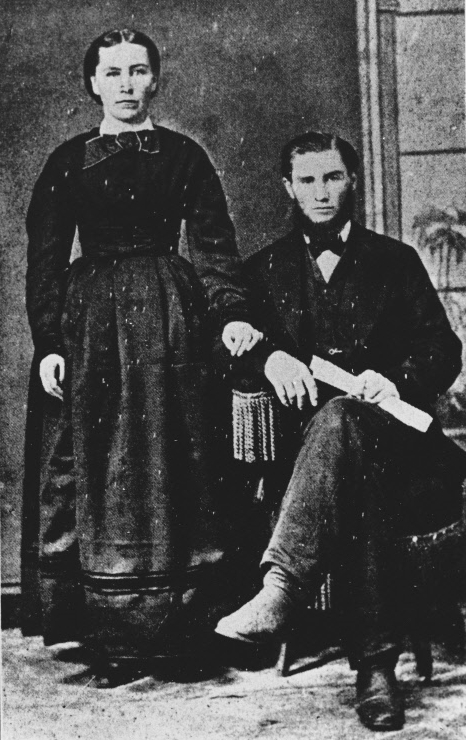
“On September 5, 1867, D. S. Warner was married to Tamzen Ann Kerr. She bore him four children, all of whom died in infancy – first a son, born December 29, 1868, and triplets, born in 1872, who only lived a few hours. This good lady died young, on May 26, 1872.” – Quoted from C. E. Brown in When the Trumpet Sounded. She is buried in Shiffler Cemetery, Jefferson Township, Ohio.
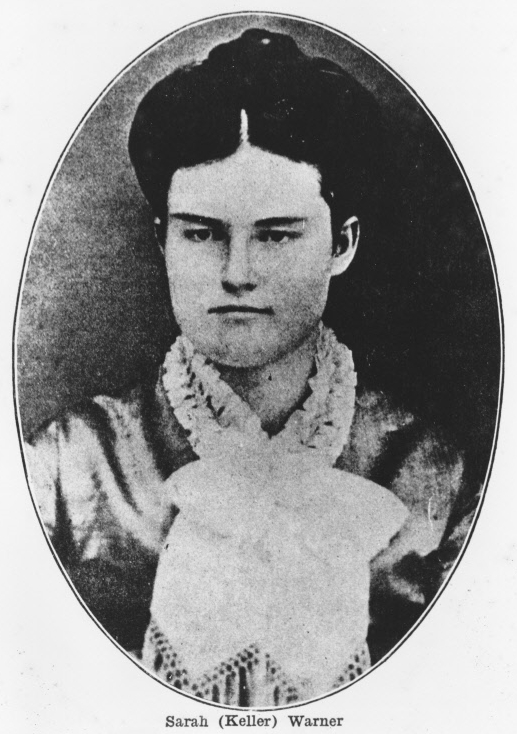
On June 4, 1874, D. S. Warner married Sarah Keller, a 19-year-old farmer’s daughter from Ohio. To this union two children were born: a daughter, Levilla Modest, born on March 18, 1875 (who also died on June 24, 1878), and a son, Sidney, born June 25, 1881. Between January 1884 and April 1884, after accepting a doctrine of marital celibacy taught by a false prophet, R. S. Stockwell, Sarah left her husband and denounced him and The Gospel Trumpet paper he published. She then returned to her parents’ home in Upper Sandusky, Ohio. She turned over custody of their young son, Sidney, early in the separation. In spite of all her husband’s prayers and pleadings for her to be reconciled to him, she divorced him in 1890 and married another man. On May 24, 1893, she died of typhoid fever in Cincinnati, Ohio. She is buried in the Spring Grove Cemetery, Cincinnati, Ohio.
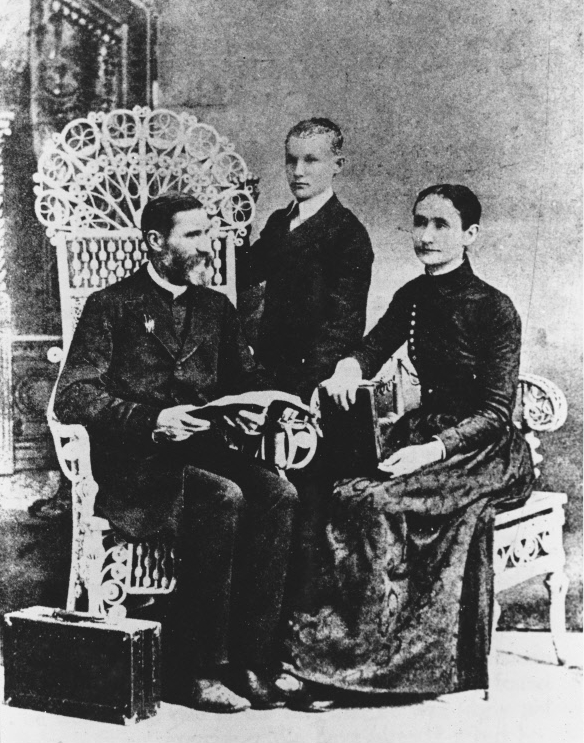
On August 12, 1893, D. S. Warner married Frances Miller who had been a part of his group of traveling, evangelistic singers. Frances (known as “Frankie”) was also a stenographer, and greatly assisted him in his writings. However, only two years and four months after their marriage, God summoned D. S. Warner’s gentle, devoted spirit home to Himself on December 12, 1895, at the age of 53, leaving him an example of what He can do with a vessel so fully yielded to His will. Warner was the author of the words to many deep spiritual songs, as well as the tunes to a few. He also authored many books and articles as well, having been the editor of The Gospel Trumpet for 14 years from its beginning in 1881. His body was laid to rest in a wooded area of the Grand Junction, Michigan, Church of God campground, near his own home where he died, and near the Gospel Trumpet’s publishing office at that time. Frankie died in 1927 in Anderson, Indiana. She had gone blind and was being cared for in the Old People’s Home in Anderson. She was buried beside her husband at the campground in Grand Junction, Michigan.
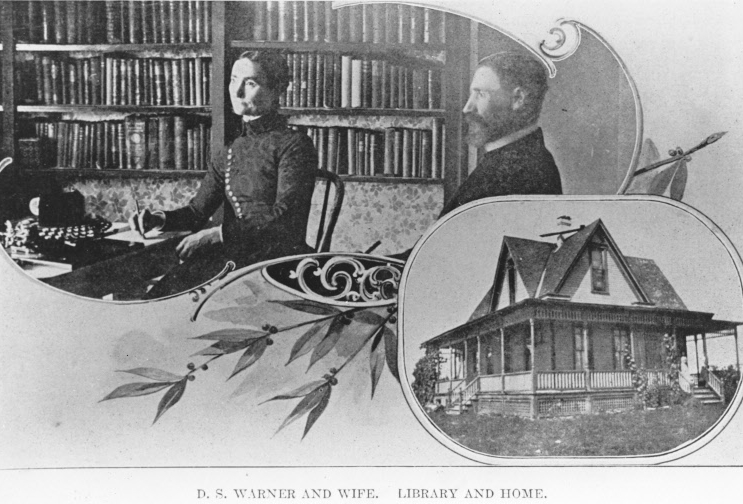
D. S. Warner and third wife, Frankie, in their library, and their home in Grand Junction, Michigan, where they were living at the time of his death.
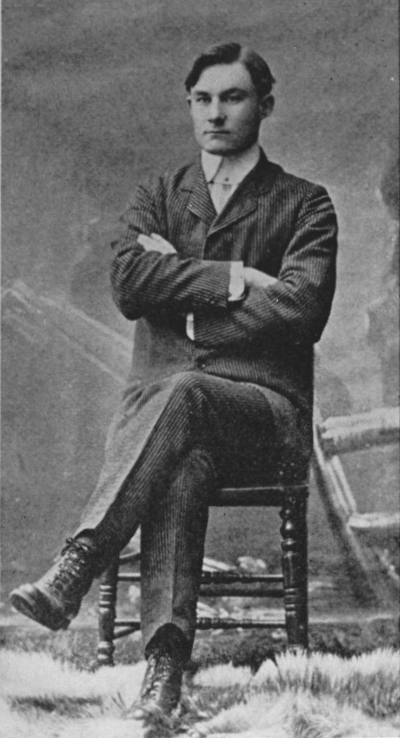
Sidney Warner, son of D. S. Warner by his second wife, Sarah. Sidney died on August 20, 1969, at the age of 88 years. He is buried in Maplewood Cemetery, Anderson, Indiana.